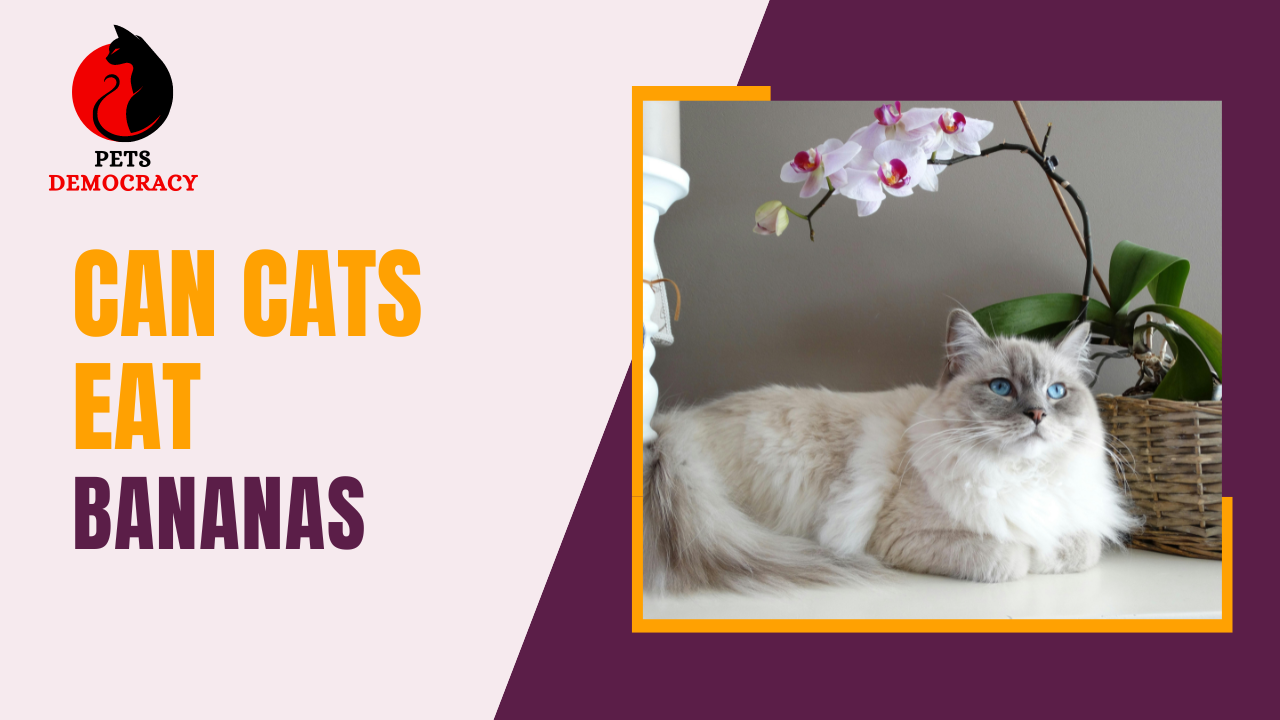
Can Cats Eat Bananas
As a cat owner, it’s natural to wonder about the foods that are safe for your furry friend to eat. If cats may safely eat bananas is one of the frequently asked questions. Bananas are packed with essential nutrients and are a popular snack among humans, but what about our feline companions?
In this article, we will explore whether Can Cats Eat Bananas and if there are any potential risks or benefits associated with this fruit. Read on to find out if it’s safe to share your bananas with your beloved pet.
The digestive system of cats
To determine whether cats can safely eat bananas, it’s important to understand how their digestive system works. Cats are obligate carnivores, which means that their bodies are designed to primarily process and derive nutrients from animal-based foods. Unlike humans, cats lack the necessary enzymes to effectively break down and digest plant matter.
While cats may occasionally nibble on grass or other plants as a way to aid in digestion or to indulge their instincts, their digestive system is not equipped to handle large amounts of fruits or vegetables. Feeding your cat bananas or any other non-meat food in excessive quantities can lead to digestive upset, including vomiting and diarrhea.
It’s crucial to prioritize your cat’s nutritional needs by providing a balanced diet specifically formulated for feline health. To ensure that your furry friend receives all the essential nutrients they need, consult your veterinarian or a pet nutritionist for guidance on the best diet for your cat.
Understanding the nutritional needs of cats
Understanding the nutritional needs of cats is crucial in providing them with a balanced and healthy diet. Cats require specific nutrients that are found in animal-based foods. These nutrients include taurine, arachidonic acid, and vitamin A, which are essential for their overall health and well-being.
While fruits and vegetables may seem like a healthy addition to your cat’s diet, it’s important to remember that cats are obligate carnivores. Their bodies are not designed to efficiently digest and absorb nutrients from plant matter. Feeding your cat a diet solely consisting of fruits or vegetables can result in nutritional deficiencies and health issues.
To ensure that your cat gets all the necessary nutrients, it’s best to opt for high-quality commercially prepared cat food. These cat foods are specifically formulated to meet the nutritional needs of cats. Consult with your veterinarian or a pet nutritionist to determine the appropriate type and amount of food for your cat based on their age, weight, and any specific health concerns they may have.
By understanding and prioritizing your cat’s nutritional needs, you can provide them with the best possible diet for their overall health and happiness.
Can Cats Eat Bananas Safely?
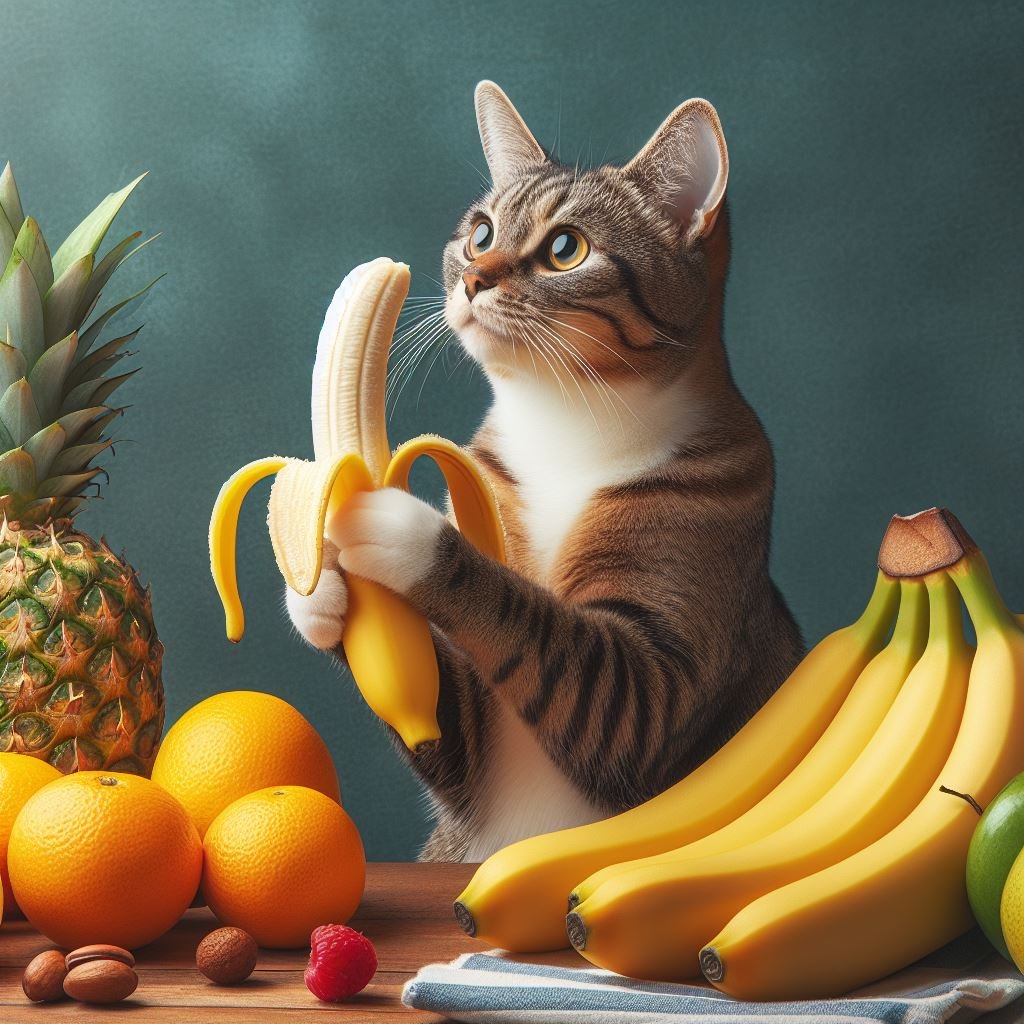
Now that we’ve established that cats are obligate carnivores and require specific nutrients from animal-based foods, let’s discuss whether it’s safe for them to eat bananas.
Cats can eat bananas without harm, although they are not a necessary component of their diet. Cats do not naturally consume fruits in the wild, and their bodies may not be able to fully digest and absorb the nutrients from bananas.
Feeding your cat small amounts of bananas as an occasional treat is generally safe. However, it’s important to remember that bananas should never replace the main source of nutrition in your cat’s diet.
If you decide to offer your cat a small piece of banana, make sure it is ripe and mashed. Remove the peel, as it can be a choking hazard. Keep a tight eye on your feline to spot any negative responses. If you notice any digestive issues or allergic reactions, discontinue feeding bananas immediately and consult your veterinarian.
Remember, always prioritize your cat’s nutritional needs and consult with a professional before introducing any new food into their diet.
Can Cats Eat Banana Bread
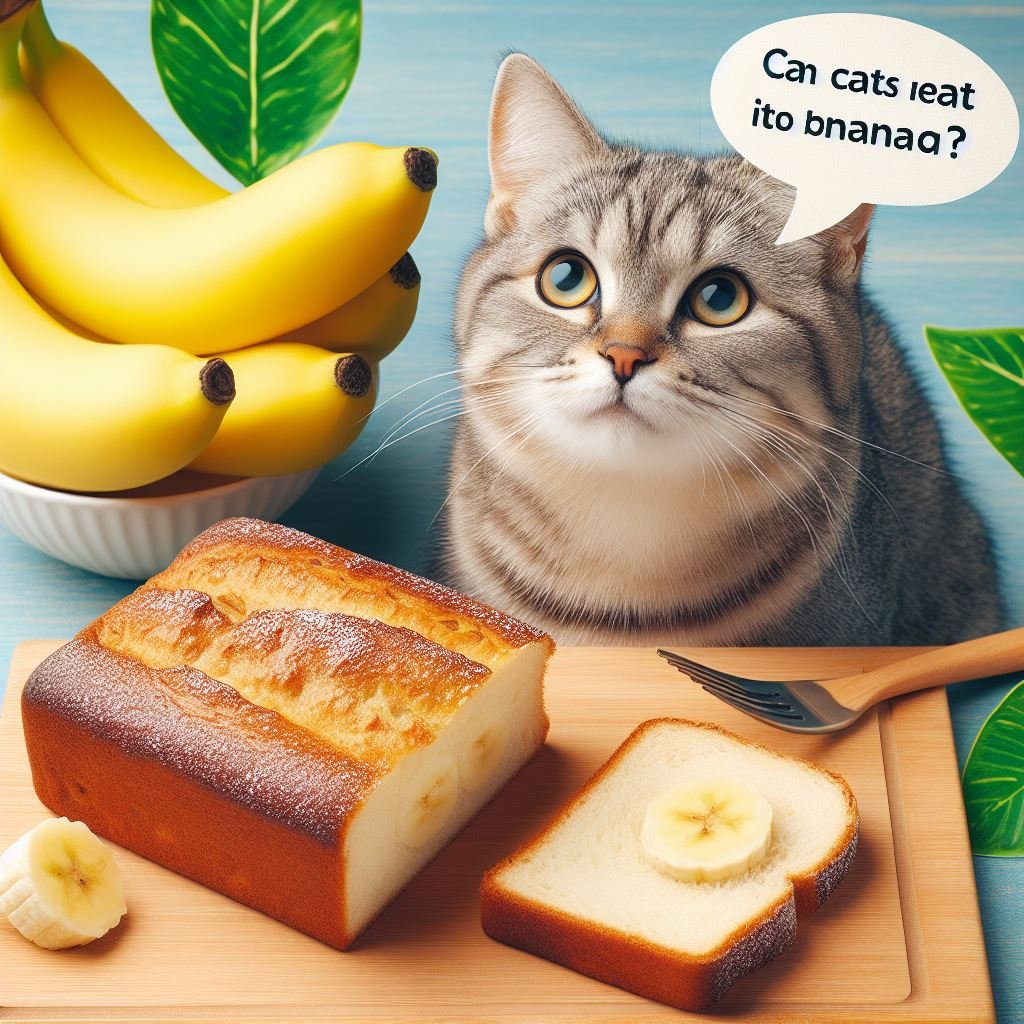
Yes, cats can eat small amounts of banana bread. However, it is important to note that banana bread should only be given as an occasional treat and not as a regular part of their diet.
Additionally, be sure to remove any nuts or raisins from the banana bread, as these can be harmful to cats.
It’s always a good idea to consult with a veterinarian before introducing any new human food into your cat’s diet to ensure their safety and well-being.
Potential Risks and Concerns
While bananas are generally safe for cats to eat in small amounts, there are some potential risks and concerns to be aware of.
One concern is the high sugar content in bananas. Cats have a limited ability to process and metabolize sugar, so consuming too much can lead to weight gain, diabetes, or other health issues. It’s important to offer bananas as an occasional treat and in small portions to avoid these risks.
Another concern is the choking hazard that banana peels can pose. Make sure to remove the peel before offering any banana to your cat, as it can obstruct if swallowed.
Lastly, some cats may have allergic reactions to bananas. Symptoms can range from mild gastrointestinal upset to more severe allergic reactions such as vomiting, diarrhea, or difficulty breathing. If you notice any adverse reactions, discontinue feeding bananas and consult your veterinarian.
Always prioritize your cat’s well-being and consult with a professional before introducing any new food into their diet.
Suggested Read: Best Cat Biscuits in the USA
Alternatives to feeding bananas to your cat
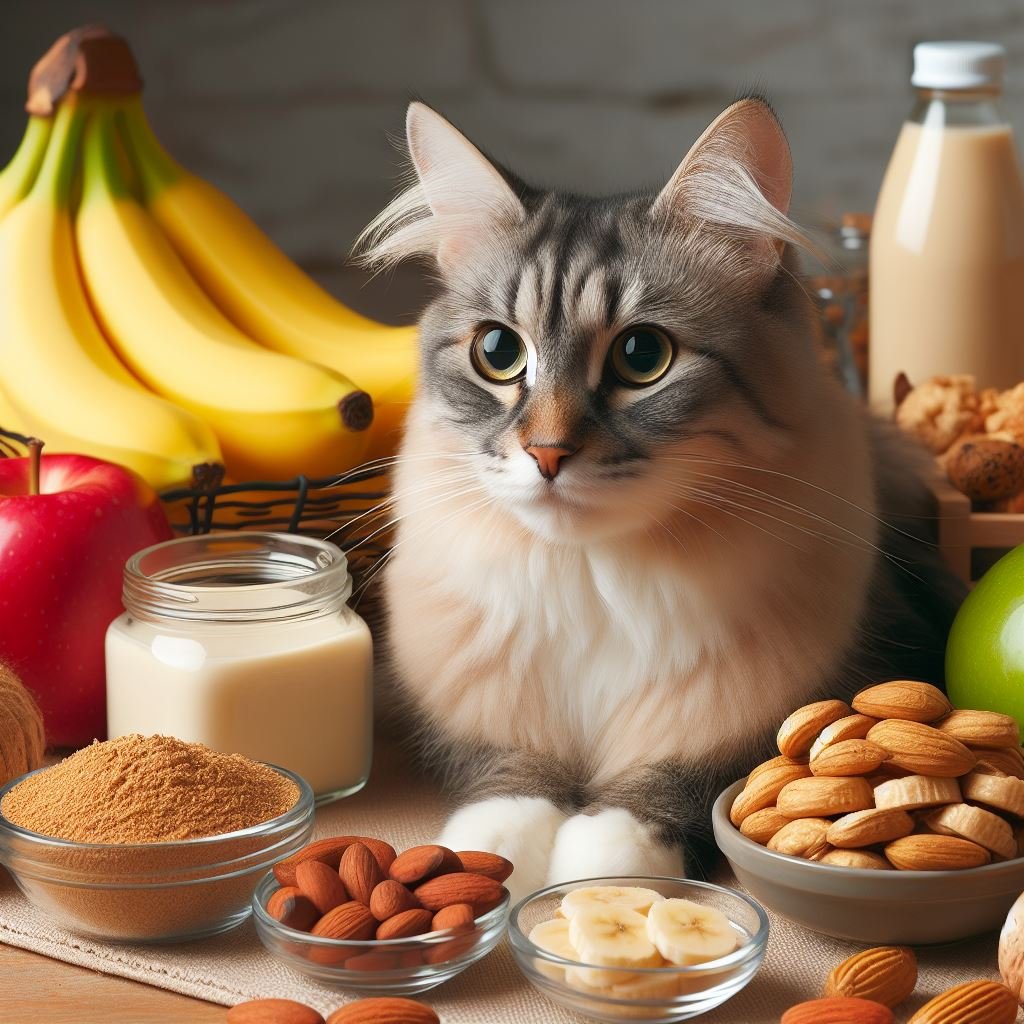
If you’re looking for alternatives to feeding bananas to your cat, several options can provide similar nutritional benefits.
One option is to offer your cat small portions of other fruits that are safe for feline consumption, such as fresh blueberries or sliced apples (without the seeds or core).
These fruits are low in sugar and can be a healthier alternative. Another option is to provide your cat with commercial cat treats specifically formulated to meet their dietary needs.
These treats often come in a variety of flavors and textures, offering your cat a tasty and safe snack. Remember, it’s always important to consult with your veterinarian before introducing any new food into your cat’s diet to ensure their overall health and well-being.
Consulting with a Veterinarian
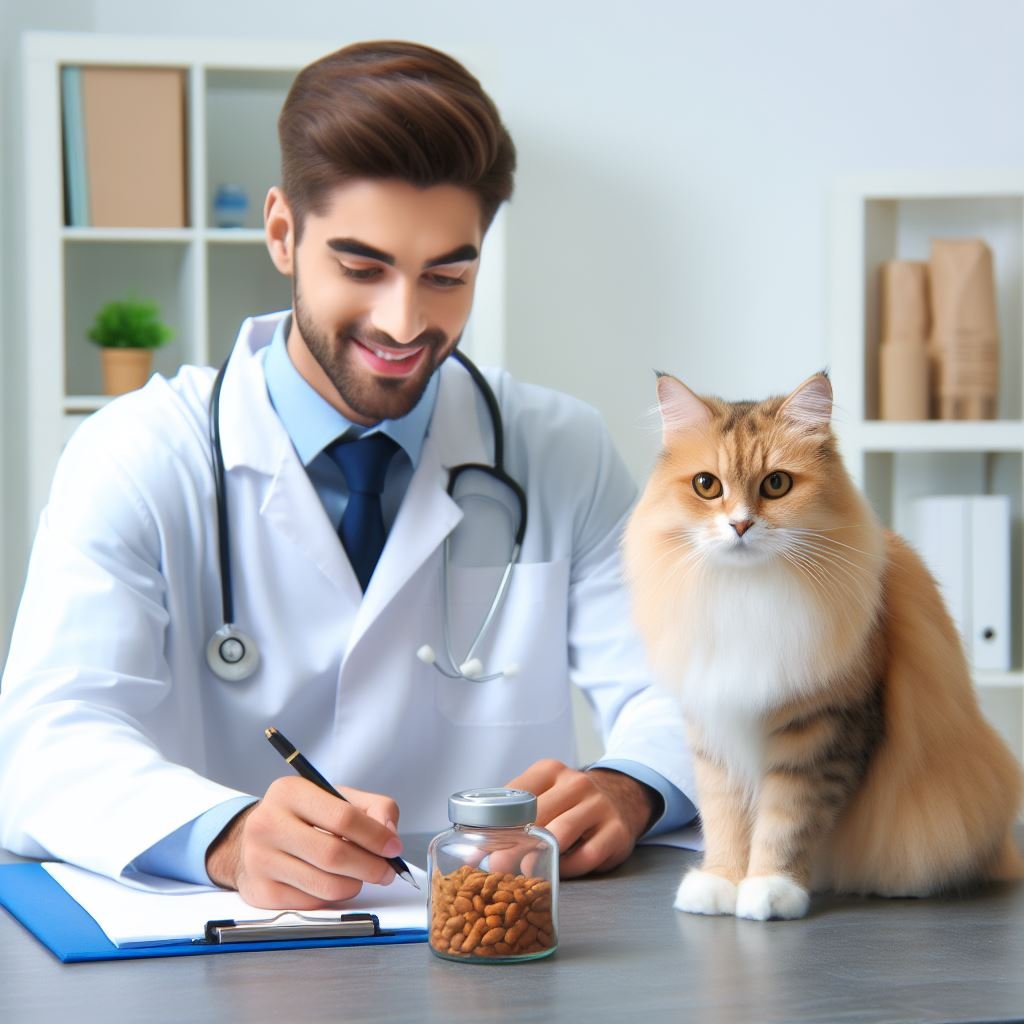
To ensure the overall health and well-being of your cat, it is always recommended to consult with a veterinarian before introducing any new food into their diet.
While there are several options for alternative fruits or commercial cat treats, it is important to understand your specific cat’s dietary needs.
A veterinarian can provide valuable insight and advice on what is safe and appropriate for your cat to consume. They can also address any underlying health concerns or allergies that your cat may have.
By seeking professional guidance, you can make informed decisions about the best diet for your feline friend, ensuring they receive the necessary nutrients while avoiding any potential risks or complications.
Frequently Asked Questions {FAQs}
Can cats eat bananas?
Yes, cats eat bananas in moderation. Bananas are non-toxic to cats and can be a healthy occasional treat. However, it’s essential to remove the peel and only offer small, bite-sized pieces to prevent choking.
Are bananas beneficial for cats?
Bananas contain essential nutrients such as potassium, vitamins, and fiber, which can be beneficial for cats in small amounts. However, they should not replace a balanced feline diet, and it’s crucial to ensure that cats primarily consume cat food formulated for their specific nutritional needs.
Can cats eat bananas too?
While adult cats can enjoy bananas in moderation, it’s advisable to avoid giving bananas to kittens. Kittens have different dietary requirements, and it’s essential to focus on providing them with a high-quality kitten-specific diet for their growth and development.
Are there any risks associated with feeding cats bananas?
Feeding cats bananas in excessive amounts may lead to digestive issues such as upset stomach or diarrhea due to the fruit’s natural sugars. Additionally, some cats may not be interested in bananas at all. It’s crucial to monitor your cat’s reaction and consult with a veterinarian if you notice any adverse effects.
How should I prepare bananas for my cat?
Before offering bananas to your cat, ensure to peel and cut them into small, manageable pieces. Cats may not be accustomed to the texture and taste of bananas, so introducing them gradually is key. Always monitor your cat while they are trying new foods and consult with your veterinarian if you have any concerns about your cat’s diet or health.
Conclusion
Based on the professional advice of veterinarians, it is crucial to consult with them before adding any new food to your cat’s diet.
Their expertise ensures the overall health and well-being of your feline companion. As a responsible pet owner, it’s important to understand that cats eat bananas in moderation can be a source of additional nutrients.
However, alternative fruits or commercial cat treats may be a viable option, but understanding your cat’s specific dietary requirements is essential.
Veterinarians can offer valuable insight, address any underlying health concerns or allergies, and guide you in making informed decisions regarding your cat’s nutrition.
Cats eat bananas because of their natural curiosity, but moderation is key to preventing any adverse reactions. Remember, a healthy cat is a happy cat, and seeking professional guidance ensures you are providing the best diet for your feline friend. So, before offering your cat that tempting banana, consult with your veterinarian to ensure their safety and well-being.
Suggested Read: Best Cat Biscuits in the USA



Pingback: What Are 10 Happy Facts About Cats » Pets Democracy